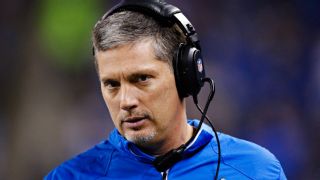|
It's eerie how often a team takes on the personality of its head coach. For the past five years, the Detroit Lions were the physical embodiment of Jim Schwartz: aggressive, rambunctious and limited by an inability -- or lack of desire -- to control their emotions. That approach served both parties well during the early years of a rebuilding effort from the 0-16 nadir of 2008, but it stunted their growth more recently and ultimately led to a decidedly fair conclusion Monday. The Lions have missed the playoffs twice since their presumed breakthrough 2011 season, and the decision to fire Schwartz was an encouraging sign that this franchise is no longer satisfied with the elevated competitiveness he provided. Schwartz spoke Sunday of the "unfinished business" awaiting him in a sixth season, but frankly, the Lions gave him an adequate time period to address the issues that have existed throughout his tenure. As the chart shows, his career winning percentage of .362 is one of the worst in NFL history for coaches who kept their jobs for at least five years. In other words, he was fortunate to have made it this far.
Since opening the 2011 season 5-0, the Lions went 16-27. In their past two seasons, when their talented roster should have been blossoming, they produced an NFL-high 67 turnovers along with the league's 11th-most penalties (210). Over the past five years, the Lions allowed their opponents more first downs via penalty (160) than all but one team. Their total of 565 penalties and 156 turnovers, along with a turnover margin of minus-31, all ranked 30th in the league. Combine those mistakes with the Lions' performance in the second half of the past three seasons, and you have a convincing portrait of an unfocused and undisciplined team. The Lions went 5-6 after a 5-0 start in 2011, 0-8 after starting 4-4 in 2012 and 1-6 after opening this season 6-3. There are plenty of explanations for why those swings occurred, but for me, it was simple. Under Schwartz, the Lions never grew up. They couldn't straddle the line between aggression and stupidity, too often falling into the morass of the latter. Like his team, Schwartz possessed some dynamic, championship-caliber traits. He is smart, schematically sound and has a big enough personality to be a strong leader. In the end, however, he couldn't subordinate his emotions at key times and wasn't humble enough to learn from his mistakes. Most notably, Schwartz's tenure was marked by a series of unseemly public outbursts. They might have elevated the Lions' entertainment value, but they also made it difficult for him to effectively demand more discipline from his players. I was stunned, for example, when Schwartz charged after San Francisco 49ers coach Jim Harbaugh after a postgame handshake in 2011. The coach whose team routinely lost its composure had stepped far beyond coaching convention and, apparently, wanted to fight in public with a counterpart. Schwartz later called the incident "regrettable" but stubbornly implied that Harbaugh had provoked the incident with a profanity and a shove. Over the years, Schwartz taunted opposing players (including Dallas Cowboys receiver Dez Bryant), was caught admonishing referee Ron Winter to learn the NFL rule book, and most recently, cursed at Lions fans who booed a late-game decision in Week 16's loss to the New York Giants. And let's not forget his impulsive decision to challenge a touchdown ruling last season, one that violated NFL rules and almost assuredly cost the Lions seven points in a close game. To be clear, Schwartz wasn't fired Monday because of a few dramatic public outbursts. But those incidents symbolized his two biggest problems in Detroit: The Lions lost focus under pressure and never did anything about it. I had no stake in whether the Lions won or lost over the past five years, but as an engaged football observer, it was disappointing to see a coach with Schwartz's potential fail repeatedly in the same manner. I recall a moment after the Lions' 2011 loss to the Chicago Bears, a game marred by five turnovers, a critical roughing-the-passer penalty on defensive tackle Nick Fairley and one major brawl. A reporter asked Schwartz about his team's lack of discipline, and he heatedly asked for examples to back up the premise. The reporter was flabbergasted, given the mountain of evidence the game had provided, and was momentarily speechless. Schwartz moved to the next question as if he had proved his point. The point was clear: Schwartz didn't view discipline as a problem. That's the kind of defiance it takes for a talented team to fall short for the same reasons in multiple seasons. Yogi Berra is reputed to have once said, "If it ain't the heat, it's the humility," and in a Yogi kind of way, those words perfectly sum up Schwartz's time as the Lions' coach.
|


